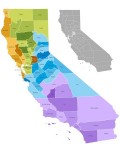
News Item: A Ballot Initiative is circulating to break California into six states. The Great Valley would become part of a mostly rural landlocked state which would include the Central Sierras.
If California were broken up into six different states, the Law of Unintended Consequences would figure prominently in our future. The Valley would lose a lot of the benefits from being a part of a great state, but would keep most of its problems.
Any article on state fragmentation can only speculate on the outcome. Any piece claiming to be authoritative would probably be discredited over time because the event would be affected by an enormous number of variables.
Freedom or Colonial Subject?
If the Great Valley were to become its own state, it would face a series of challenges at the outset. One of the major problems is the lack of control over its own resources. Much of the area is owned and controlled by interests outside the proposed state.
Large areas of land are owned by corporations outside our boundaries. Out of area investors own shopping malls, apartments, and houses. A substantial percentage of water resources is owned by outside interests such as the City of San Francisco and East Bay Municipal Utility District (serving the Bay Area). Much of the agriculture industry is owned and controlled by out of area companies.
Since much of the wealth of the Great Valley is owned and controlled by interests outside of the proposed state, the new state would operate more as a colony than as an independent political entity. The outside interests would work to influence legislation to their benefit and to the detriment of local citizens. The political system could become corrupted as much or even more than the current governing bodies. A smaller political organization may be easier to control.
A Poverty State
A large percentage of the population in the Valley and mountain regions of the new proposed state is unemployed. The new state would start out with the largest unemployment rate in the nation.
Because so many people who live within the area are dependent on public welfare programs, fragmenting California would cut a large number off from the income and other benefits of those programs. The poverty would be exacerbated enormously and would likely lead to substantial social unrest and disruption.
A new state would not have the means to support all those who are presently dependent on social programs. Meanwhile, the wealthier new states in the fragmented California would be relieved of the burden of providing a subsistence existence to Valley citizens.
A new Great Valley state would not have the means to maintain roads or infrastructure. It might need to establish toll roads on Interstate 5 and Highway 99 to collect revenue from citizens of the other new states passing through just to maintain those roads.
Federal Mandates
A new Great Valley state would have to figure out how to meet costly federal mandates that presently constitute a burden and that would not go away upon statehood. New industry would still be constrained by federal air quality standards. Schools would still need to adhere to costly federal operational requirements.
An Endless Array of New Problems
Statehood would introduce the problem of providing the services to citizens that the State of California presently provides. There are laws to be created and then enforced, business and environmental regulations to protect the public, and one hundred fifty years of governance to replicate if a new state is created.
The proponents of the fragmentation of California will make the case as to the potential benefits. For the Great Valley and mountains region, the benefits would probably not exceed the number of problems new statehood would create.
